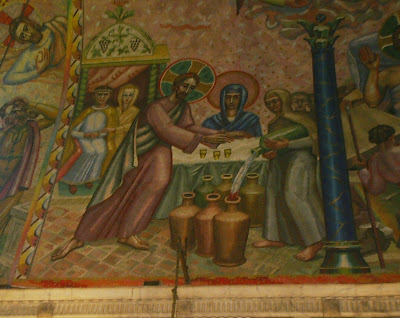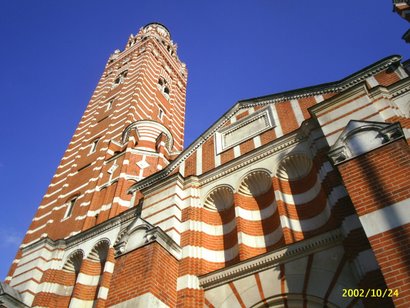The Marriage Feast at Cana

More earthly banquests, as many of us can testify after the Christmas season, can also serve up a great deal of stress. I had my family over for Boxing Day, and cooked Christmas dinner for them – an activity that is heart-stopping in itself – only to find that one of my nieces had turned vegetarian during the year, and ended up with just a plate of sprouts. Trying to anticipate what young adults will drink these days is a nightmare; ‘What do you want’, I asked my nephew, gesturing to my pretty well-stocked drinks cupboard. ‘I’ve got most things.’ ‘Malibu’ was his baffling reply. With younger relatives, guessing their favourite soft drink is not only difficult, but risks labelling you an out-of-touch ‘really old person.’ Do people still drink lemonade? Is Coke alright, or will they want Pepsi? Should it be Pepsi Max, Lite or Diet?
Hosting a dinner is fun. You have to keep telling yourself, over and over. The worst scenario is something like the marriage feast of Cana. it sets the tone for the married life that has begun. A big, public event, to mark the joyful commencement of a life together. Then to run out of drink. Not only will it end the evening prematurely and in bad grace; it sends out a signal about meanness and bad planning.
It is Mary who spots it because, like all mothers, she has her eyes on the bigger picture. Mothers notice when something is not right. But when she taps Jesus on the shoulder, he turns and says to her ‘Woman, why are you bothering me?’. We are troubled, because this is not what we want Jesus to say, least of all to Mary. Goodness knows what he meant! Maybe he was joking. Perhaps his mother had interrupted him in the middle of a conversation. It could be that he was embarrassed because his disciples were responsible for finishing all the drink.
 This scene (pictured here in the mosaics of the Lady Chapel, above) has been understood in many ways. It is traditionally seen as part of the Lord’s Epiphany – showing him forth to the world - and we are told specifically that it is the first of the signs he worked in his minstry. Many emphasise that the story is a blessing of the married state; the prayers we use during the wedding service mention that Jesus ‘hallowed matrimony by his presence at Cana’. The miracle foreshadows the Eucharist, the wine of Christ's presence bringing liberation from fear and loss, and points forward to the last meal Our Lord will share with his discsiples. This gospel story underlines Our Lady’s role in interceding for us. It is also an example of the exuberant generosity of God. A priest friend, estimating the standard size of water jars and the numbers of people likely to be there, has worked out that Jesus produced seven bottles of superior wine per person. God doesn’t just give you enough – he over-caters madly!
This scene (pictured here in the mosaics of the Lady Chapel, above) has been understood in many ways. It is traditionally seen as part of the Lord’s Epiphany – showing him forth to the world - and we are told specifically that it is the first of the signs he worked in his minstry. Many emphasise that the story is a blessing of the married state; the prayers we use during the wedding service mention that Jesus ‘hallowed matrimony by his presence at Cana’. The miracle foreshadows the Eucharist, the wine of Christ's presence bringing liberation from fear and loss, and points forward to the last meal Our Lord will share with his discsiples. This gospel story underlines Our Lady’s role in interceding for us. It is also an example of the exuberant generosity of God. A priest friend, estimating the standard size of water jars and the numbers of people likely to be there, has worked out that Jesus produced seven bottles of superior wine per person. God doesn’t just give you enough – he over-caters madly!This gospel is about all these things. But it strikes me just now as a story of rescue from a horrible situation. I keep thinking about that steward, who must have seen the crisis gradually unfolding, and could do nothing about it. He was mortified. This is a story about embarrassment, the fear of being shown up as inadequate. I’ll bet the steward had told the family beforehand that they hadn’t ordered enough wine. They hadn't listened to him, and he could do nothing about it. Now it was all going wrong, like an accident in slow motion, and all he could do was watch, and know that is career was at an end.
I think that’s what we can identify with in the story – that sense of need to keep up appearances. We live our lives on the surface afraid that our inner resources won’t be enough. We fear being found out, inadequate, not good enough. I was struck and horrified, two years ago, following the funeral of a young man who had committed suicide, at just how many of his friends told me then understood him. Wealthy, attractive they all were, with high powered jobs in the City. But they told me (with the candour that comes on these occasions) that they were afraid; afraid of the way that their lifestyle was draining them, of the energy it needed to keep up the appearance of having fun, of the shallowness of it all. You don’t need to be a young city slicker to feel that. Many people are only just holding it together, terrified of running out of juice, of not being able to cope any more, of being found out.
What we have to do with our own insecurities and fears is to invite Jesus to the party. Not just to the front of house, but to what is really going on. In general it’s not only our friends and colleagues that we present our best face to; it’s God as well. We offer him our love and our lives, but we hide a little bit away, down there; the bit we’ve told ourselves is too deep, too ingrained, too painful. We don’t want to bother the Lord with that, and we hold back from asking him to enter there. It's mentally excluded from our prayer, our confession, our description of ourselves.
 Jesus lets the steward off the hook – but at first appears not to care, or even to see that the problem is his. It may be that Jesus seems reluctant to work his miracle in our lives; but we have to be bold in asking, and patient in waiting. Above all, we need the courage and trust to bring to him all we are, and believe that he can change the situation. Not just the good bits, but also those areas of lack, uncertainty and fear in our lives, those things that seem fixed, and that we feel we can do nothing about.
Jesus lets the steward off the hook – but at first appears not to care, or even to see that the problem is his. It may be that Jesus seems reluctant to work his miracle in our lives; but we have to be bold in asking, and patient in waiting. Above all, we need the courage and trust to bring to him all we are, and believe that he can change the situation. Not just the good bits, but also those areas of lack, uncertainty and fear in our lives, those things that seem fixed, and that we feel we can do nothing about.Unless we do this, we shall run dry. Jesus is present at Cana to bless not just the highpoint of a life, but also the low point. If we trust him enough, he can work his miracle for us, and turn the water of our anxieties into the wine of joy.

2 comments:
Super post, Fr.! Thanks so much :)
Oh, thank you for that!
Post a Comment